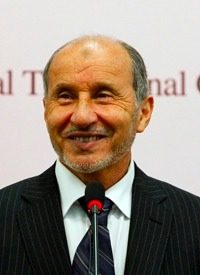
The two neighboring rulers lavished praises on each other’s regimes and promised to pursue close cooperation on everything from “security” to transportation. Al Bashir also emphasized his disdain for late Libyan strongman Moammar Gadhafi, who supported various rebel groups in Darfur and South Sudan.
“The Libyan people have presented the greatest gift for the Sudanese people, that is, liberating Libya from Gadhafi and his regime,” al-Bashir told Sudan’s ruling National Congress Party (NCP) during a conference held while Jalil was visiting. “The biggest harm inflicted on Sudan was by Gadhafi’s regime. It was bigger than any harm caused by any of the colonialist countries hostile to Sudan.”
NTC boss Jalil, Gadhafi’s former “Justice Minister” who defected to the rebels early on, thanked the communist-backed regime in Sudan for its support of the Libyan revolution. Along with NATO and other foreign powers, al-Bashir provided massive stockpiles of weapons, ammunition, and military support for the Western-backed rebel cause throughout the civil war.
“We appreciate the Sudanese stance,” Jalil told the NCP general conference. “If it had not been for Sudanese military assistance, the Libyan city of Kufra would not have been liberated from the hands of Gadhafi’s forces. The weapons and ammunition which Sudan donated even reached the Western Mountains, by way of our sister Egypt.”
After the official talks between the two rulers, al-Bashir announced to the world that the regimes would immediately begin forging closer ties. “The relations between Sudan and Libya are deeply-rooted and historical,” the Islamist despot told the media. “We have agreed to bolster the aspirations of the two peoples within these relations.”
The regime in Sudan has been listed by the U.S. State Department as an official “State Sponsor of Terror” for almost two decades. It has hosted former al-Qaeda boss Osama bin Laden and other senior figures in the terror network, who were deeply hostile to Gadhafi‘s relatively secular iron-fisted rule. Sudanese rebel leaders, many of whom once had a safe haven in Gadhafi’s Libya, have now been forced out.
Al-Bashir is also wanted by the International Criminal Court (ICC) for genocide, war crimes, and crimes against humanity in the Darfur region and in South Sudan, which finally became an independent nation earlier this year. Most recently the mass murderer has taken to slaughtering civilians in the Nuba mountains, according to human rights groups.
Despite all of that, cooperation between al-Bashir’s dictatorship and the new regime in Libya — which was supposed to be an American ally — will be wide ranging. Jalil promised “high-level security cooperation.” And according to the war criminal in Khartoum, the process will be expanding quickly as Sudan helps Libya build “state institutions.”
“It has been agreed on the establishment of a real integration between Sudan and Libya to begin with linking the two countries with paved roads and communications,” al-Bashir said. “There will also be integration in the economic field to utilize the two countries[‘] capabilities for the interests of the two sisterly peoples.”
After the “collapse” of the Soviet Union, the communist dictatorship ruling mainland China became a key source of support for the tyranny of al-Bashir, who seized power in a 1989 military coup. Earlier this year the Chinese regime was widely condemned for illegally arming and supporting the Sudanese dictatorship, but the relationship is so close that al-Bashir calls communist strongman Hu Jintao his “friend and brother.”
Ironically, despite the deep animosity between the Sudanese regime and Gadhafi, Beijing was also plotting to covertly arm the ex-Libyan despot in violation of international sanctions. Some analysts, however, speculated that the move was intended as a “hedge” in case the rebels, whom China was also supporting, ended up being crushed.
But after the Western-backed, regime-change operation succeeded in ousting Gadhafi, Libya and Sudan have much more in common. Both countries, for example, are governed by a hybrid of socialism and Sharia law — though Libya can thank the U.S. government for its help in creating the draft Constitution.
Both nations are also ruled by regimes that are — at the very least — sympathetic to Islamic terror and groups such as al-Qaeda. Despite reports of recent moderation, the Sudanese dictatorship has a long history of supporting terrorism — especially organizations such as al-Qaeda, which sought to overthrow Gadhafi. And after the late despot’s execution, al-Qaeda’s flag was spotted flying above Libya’s NTC headquarters at the Benghazi courthouse.
There are ongoing civil wars in both countries, too. Though South Sudan was finally allowed to secede after a two-decade civil war and a referendum, there are several conflicts still raging across the nation. And in Libya, militias have been fighting among themselves even as Gadhafi loyalists continue to stage deadly attacks.
Photo of Mustafa Abdul-Jalil: AP Images
Related articles:
Red China Increases Investments and Influence in Sudan
Troubled South Sudan Officially Independent
Al-Qaeda and NATO’s Islamic Extremists Taking Over Libya
Al-Qaeda Flag Flies in Libya As Conflict Rages
China Offered Gadhafi Arms Despite Libya Embargo
Communists Criticize Southern Sudan Referendum, Despite Its Success



